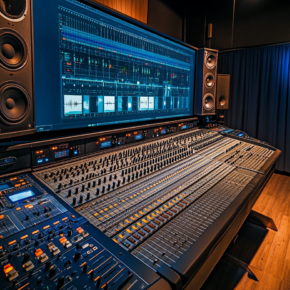Are you ready to take your music to the next level? Avoiding mistakes before mixing is a crucial part of the process. Simple errors, like messy file organization or overprocessed tracks, can delay your project and lower the quality of your final mix. By properly preparing your tracks, you ensure a smoother process and a better sound. Let’s explore the most common mistakes and how to fix them.
Why Avoiding Mistakes Before Mixing Matters
Avoiding mistakes before mixing allows the engineer to focus on enhancing your music rather than fixing avoidable issues. Well-prepared tracks save time, reduce costs, and lead to a polished, professional result.
Common Mistakes Before Mixing
Disorganized Files Waste Time
Mislabeled or scattered files make it hard for engineers to work efficiently.
Solution:
Use clear, simple labels like “Lead Vocal” or “Bass Guitar.” Organize tracks in folders for easy navigation.
Incorrect Track Levels Cause Problems
Tracks that clip or are too quiet create challenges. Clipping distorts the sound, while low levels make balancing harder.
Solution:
Keep track levels between -6 dB and -10 dB to ensure enough headroom for adjustments.
Transform your next hit?
Leaving Noise in Tracks
Clicks, pops, and unwanted sounds distract from the mix. They also add unnecessary work for the engineer.
Solution:
Remove noise and unused takes before sending your tracks. Send clean, edited files for mixing.
Overprocessing Reduces Flexibility
Excessive use of effects like EQ or compression limits what the engineer can do.
Solution:
Send raw tracks without heavy processing. Provide a reference file if specific effects are important to your vision.
No Reference Tracks Lead to Confusion
Without examples, engineers may struggle to understand your vision.
Solution:
Include reference tracks that match the sound you want. This helps the engineer create a mix that aligns with your expectations.

How to Avoid Mistakes Before Mixing
- Organize Tracks Properly
Label files clearly and group similar ones into folders. - Set Proper Levels
Avoid clipping and maintain enough headroom for adjustments. - Clean Up Files
Remove noise, unwanted takes, and silent sections. - Avoid Excessive Effects
Send unprocessed files to give the mixer flexibility. - Provide Reference Tracks
Offer examples that reflect your desired sound. - Communicate with the Mixer
Discuss your goals and ensure both sides understand the project.
FAQs About Mistakes Before Mixing
What is the biggest mistake artists make before mixing?
Disorganized files or tracks with noise are common issues that slow down the process.
Should I apply effects before mixing?
No. Avoid overprocessing. Send raw tracks to give the mixer more control.
Why do my tracks sound distorted?
Distortion occurs when tracks clip during recording. Proper gain staging can fix this.
Are reference tracks necessary?
Yes, they help the engineer understand your vision and achieve the sound you want.
Can I prepare tracks for mixing at home?
Yes, with proper organization, editing, and communication, you can prepare effectively.
How do I clean up my tracks?
Remove background noise, silence, and bad takes to create polished files.
Conclusion
Avoiding mistakes before mixing is key to getting a professional-quality result. Simple steps like organizing files, cleaning up tracks, and providing references make the process smoother. With these tips, you’ll set yourself up for success and ensure your music sounds its best.





